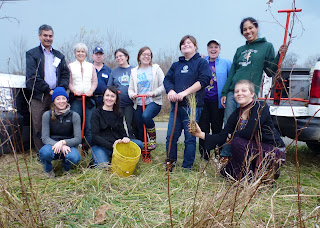Educators from Illinois, Indiana, and Wisconsin attended IISG’s workshop Nov. 9-10 to increase the presence of Great Lakes science in their classrooms and to improve student awareness of issues related to the Lakes.
Illinois-Indiana Sea Grant partnered with Chicago’s Shedd Aquarium and the National Park Service Great Lakes Research and Education Center and the Dunes Learning Center to host the workshops, which provided opportunities for teachers to engage in science and math data collection and hands-on field work. Educators previewed Sea Grant’s Greatest of the Great Lakes and Fresh and Salt curricula to familiarize themselves with the diverse range of learning formats to enhance their science, math, and engineering units, as well as activities from Great Lakes in My World by the Alliance for the Great Lakes. Also, as part of the new Center for Great Lakes Literacy, workshop attendees learned how to help protect and restore coastal areas in the Lake Michigan watershed through a variety of teaching methods.
All of the teachers who attended this year’s workshop were excited to learn about programs like the Alliance for the Great Lakes’ Adopt-a-Beach, as well as the many exciting student stewardship activities offered by the Shedd Aquarium, the Dunes Learning Center, and the Indiana Dunes National Lakeshore botanists. They also enjoyed the hands-on activities, including using the Enviroscape model to learn about point source/non-point source pollution, and learning how to use GLNPO’s Hydrolab water quality monitoring instrument.
The feedback and comments from teachers was especially positive. Said one attendee, “You’ve given me great ideas about water quality, drinking water, invasive and noninvasive species, habitat restoration, and stewardship projects I can provide for my kids to become ‘Great Lakes literate.’”
To learn more about IISG’s educational programs and resources, visit our education webpage, and follow us on Facebook and Twitter for more events, workshops, and information.
This Center for Great Lakes Literacy project was funded through a grant from the U.S. EPA Great Lakes National Program Office.
Illinois-Indiana Sea Grant’s education team led a workshop for teachers and administrators in the Blue Island, Illinois school district recently, offering lessons, materials, and training on bringing Great Lakes science to their classrooms.
Susan Ask, who works with IISG’s Lawn to Lake program, sent along some details about the workshop and the enthusiastic reception from the teachers:
“We had a fun and energetic workshop with teachers and principals in the Blue Island School District. The workshop focused on water quality and drew on three major initiatives within Sea Grant: Lawn to Lake, the Great Lakes Field Experiences for Watershed Educators (B-WET), and Increasing Citizen Involvement and Great Lakes Literacy (Center for Great Lakes Literacy).
We began with the basic definition and ecology of watersheds, then moved to an exploration of watershed and water quality issues brought on by urbanization, landscaping practices, and waste disposal. Teachers learned basic ecology that they can teach in their classrooms. We identified point- and non-point sources of pollution and talked about available solutions for individuals and communities to adopt.
After a presentation and discussion, we toured the recently installed rain gardens in the courtyard at Blue Island Elementary School so we could see theory put in to practice. The courtyard contains a rich variety of native plants that creates a beautiful garden throughout the year while also managing and controlling rainwater. Runoff from the roofs will be collected in rain barrels all around the building, and can then be used on the landscape as needed.
The watershed model was a big hit. We used a three-dimensional model of a watershed, with rivers and lakes, houses, farms, factories, water treatment facilities and other developments, to see how water and pollutants move through the community. Teachers will be able to borrow this model for use in their classes, helping students understand the connection between people, land use, and water. But we didn’t just look at problems. The model also let us see how natural lawn care, rain gardens, rain barrels, permeable pavement, and other practices can help prevent pollution and reduce runoff.
We showcased many of the program’s Great Lakes curricula – Fresh and Salt, Greatest of the Great Lakes, and Sensible Disposal of Unwanted Medicines. Teachers broke into groups to experience some of these classroom activities and share how they might incorporate them in their lessons. They also learned how the Great Lakes Literacy Principles will be a great way to introduce current Great Lakes issues to their students.
Most of the teachers told us that they haven’t yet integrated Great Lakes information in their educational activities, but that they plan to do so now after learning more about water quality and educational resources at the workshop.
We’re very excited to see these dedicated teachers assist and guide their students to learn more about the Great Lakes, water quality, and practical stewardship of water and land.”
In addition to Susan, the workshop was also led by IISG’s Robin Goettel and Terri Hallesy. If you are interested in educational materials and opportunities for yourself or teachers in your school/district, contact Robin or Terri at the links above or visit us online to learn more.



